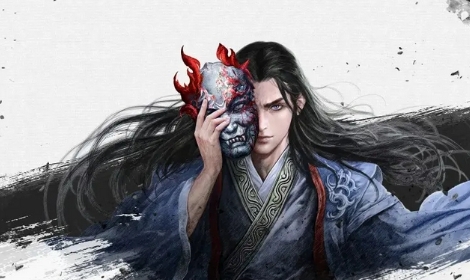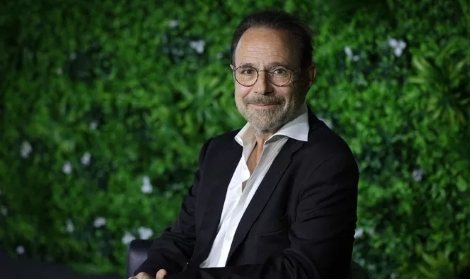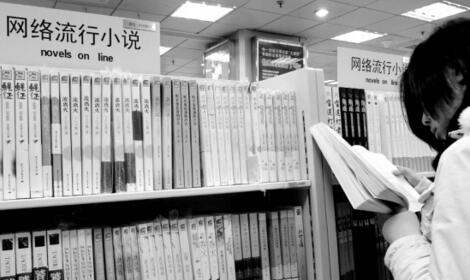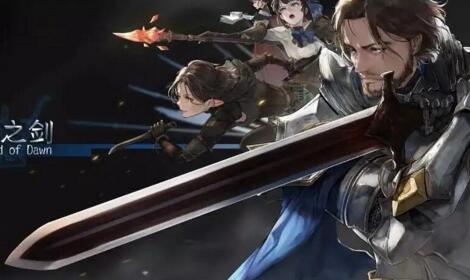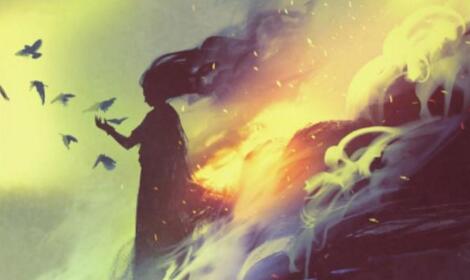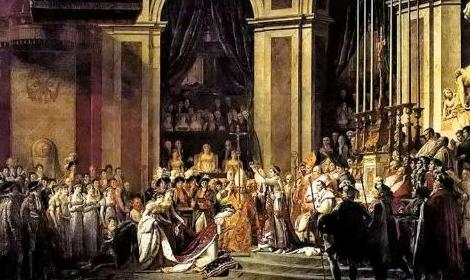你读过的所有小说中,最喜欢的最后一句话是什么?
正文翻译
What is your favorite last sentence from any novel you've read?
你读过的所有小说中,最喜欢的最后一句话是什么?
Jay Bazzinotti
Kindness is never wasted: love is never a mistakeUpvoted by
Kristin Moore, Avid and voracious reader since 1986
善意从不被辜负,爱也从来都不是错误。
克里斯汀·摩尔 ,自1986年以来,狂热而贪婪的读者

In the book “Flowers for Algernon” by Daniel Keyes, the main character, Charlie Gordon, a mentally retarded janitor is given an operation that makes him the smartest man in the world. However, over time his intelligence starts to fail. To make matters worse the mouse, Algernon, that they tried the operation on first, gets dumber and dumber until he dies. Charlie, still a pretty smart guy, realizes what the end game is. As everyone watches him decline with pity and remorse and helplessness, the one thing Charlie retains as he loses his intelligence is his self awareness. He knows he’s going to die. So to escape the constant surveillance, guilt and curiosity of everyone he knows and has befriended, he decides to run away and die alone. In the last line of the book he leaves a note for his teacher and former lover: “And if you remmber pleze put flowers on Algernons grave in the bakyard for me.” I cried like the 12 year old I was at the time. This book had a greater emotional impact on me than anything I have ever read.
在丹尼尔·凯斯的《献给阿尔吉侬的花束》中,主角查理·戈登是一名智力障碍的看门人,他接受了一项手术,成为了世界上最聪明的人。但随着时间推移,他的智力开始衰退。更糟的是,最先接受手术的老鼠阿尔吉侬变得越来越笨,最终死去。此时仍相当聪明的查理意识到了结局。当所有人都带着怜悯、懊悔和无助看着他日渐衰退时,他在失去智力的过程中唯一保留下来的是自我意识,他知道自己即将离世。为了逃离所有认识和结交过的人的持续监视、愧疚感与好奇心,他决定逃离,独自死去。在书的最后一行,他给曾经的老师兼恋人留下一张便条:“如果你还记得的话,请帮我在院子里阿尔吉侬的墓上放上花。”当时年仅12岁的我哭得一塌糊涂,这本书带给我的情感冲击比我读过的任何作品都要强烈。
“The republic was never restored.” It’s from the postscxt to Claudius the God by Robert Graves. In Graves’ fictionalised account, Claudius was secretly a republican all his life, and this informed many of his actions, working quietly through the reigns of several Emperors—including his own!—to restore the Roman Republic.
“共和国从未复辟。”这句话出自罗伯特·格雷夫斯的《神的克劳狄乌斯》的后记。在格雷夫斯的虚构叙述中,克劳狄乌斯一生都秘密秉持共和主义信念,这一点影响了他的诸多行为,他在几位皇帝(包括他自己在内!)的统治期间默默努力,试图恢复罗马共和国。
Kelsey L. Hayes
That would be the closing line from “It,” by Stephen King. Possible spoilers ahead if you’re genuinely not sure how the story ends.
那一定是斯蒂芬·金的《它》的结尾句。如果你真的不确定故事的结局,前方可能有剧透。
Or so Bill Denbrough sometimes thinks on those early mornings after dreaming, when he almost remembers his childhood, and the friends with whom he shared it.
比尔·登布罗有时会在梦醒后的清晨这样想,那时他几乎能回忆起自己的童年,以及那些与他共度童年的朋友。
The preceding grafs are a rumination of the nature of childhood and mortality, how childhood “confirms mortality” and how mortality in turn “defines all love and courage.”
前面的段落一直在沉思童年与死亡的本质,探讨童年如何“印证死亡的存在”,以及死亡又如何反过来“定义所有的爱与勇气”。
It’s a bittersweet thought because the “curse” of the surviving Derry children (now adults) is that after they’ve left Derry, the memories of their childhoods and what they encountered there slip away from them, and it’s implied that with Pennywise defeated (apparently …), this memory loss will now be permanent, and eventually Bill and Co. will completely forget about the other children in their group.
这是一种苦乐参半的想法,因为德里镇幸存的孩子们(如今已长大成人)背负着一个“诅咒”:离开德里镇后,他们关于童年以及在那里遭遇的一切记忆都会逐渐淡去。而且书中暗示,随着潘尼怀斯(显然……)被击败,这种失忆将成为永久性的,最终比尔等人会彻底忘记小组里的其他伙伴。
It’s sort of an accelerated take on the normal course of childhood and growing up. How many of us struggle to remember someone’s name or a face from our childhood? How many of us have completely lost contact with everyone or nearly everyone we knew as young children? Bill’s experience is not all that unusual, it’s just that the bad juju of Derry makes his memory loss more profound.
这在某种程度上是对童年和成长正常过程的一种加速呈现。我们中有多少人努力回想童年时某个人的名字或面容却无果?又有多少人已经与童年时认识的所有人或几乎所有人彻底失去了联系?比尔的经历其实并不算特别,只是德里镇的不祥之气让他的失忆更为严重。
The true closing line — “and the friends with whom he shared it” — really encompasses the story’s theme of friendship, sacrifice and collective courage. The Derry kids were always stronger together and in total; that they were once seven and begin their adult trial down to six is considered a grievous hardship that they struggle to overcome. It’s amazing that a story about children’s terror and a monster in the sewers ends up as a reflection of childhood bonds, but here we are. It’s a bittersweet, emotionally fraught and deeply moving line, all the more so because Bill doesn’t actually remember his friends — he almost does.
真正的结尾句——“以及那些与他共度童年的朋友”——确实囊括了故事关于友谊、牺牲和集体勇气的主题。德里镇的孩子们团结一心时总是更强大;他们曾经有七个人,而开始成年后的试炼时只剩下六个,这被视为他们难以克服的巨大困境。一个关于孩童恐惧和下水道怪物的故事,最终却成为对童年羁绊的反思,这着实令人惊叹,但事实就是如此。这句话苦乐参半、情绪饱满且极具感染力,尤其是因为比尔其实并没有真正记起他的朋友——他只是快要记起来了。
Adulthood, it seems, eventually takes every aspect of childhood from you — even memories of friends with whom you fought demonic inter-dimensional clown-spider monsters.
成年似乎最终会夺走你童年的一切——甚至包括那些曾与你一同对抗跨维度恶魔小丑蜘蛛怪的朋友的记忆。
Himanshu Mishra
I have read a few books.
我读过几本书
I am going to cheat on this one … shamelessly. (Don’t say I didn’t warn you.) This is one of my favorite closing passages. From A Tale of Two Cities by Charles Dickens. If you are feeling particularly pedantic, just skip to the last line.
我要在这个问题上“作弊”了……毫无顾忌地作弊。(别说我没警告过你。)这是我最喜欢的结尾段落之一,出自查尔斯·狄更斯的《双城记》。如果你觉得过于较真,直接跳到最后一句即可。
“I see a beautiful city and a brilliant people rising from this abyss, and, in their struggles to be truly free, in their triumphs and defeats, through long years to come, I see the evil of this time and of the previous time of which this is the natural birth, gradually making expiation for itself and wearing out.”
“我看见一座美丽的城市和一群杰出的人民从这深渊中崛起,在未来漫长的岁月里,在他们为真正自由而奋斗的过程中,在他们的胜利与失败中,我看见这个时代以及孕育它的前一个时代所犯下的罪恶,正在逐渐赎罪并消逝。”
"I see the lives for which I lay down my life, peaceful, useful, prosperous and happy, in that England which I shall see no more. I see Her with a child upon her bosom, who bears my name. I see her father, aged and bent, but otherwise restored, and faithful to all men in his healing office, and at peace. I see the good old man, so long their friend, in ten years' time enriching them with all he has, and passing tranquilly to his reward.”
“我看见我为之献出生命的人们,在我再也见不到的英格兰,过着平静、有益、富足而幸福的生活。我看见她怀中抱着一个孩子,那孩子承载着我的名字。我看见她的父亲,年迈驼背,却已恢复健康,坚守着治病救人的使命,对所有人都心怀善意,内心平静安宁。我看见那位长久以来一直是他们朋友的善良老人,十年后将自己的一切都赠予他们,然后安详地离世,去往应得的归宿。”
"I see that I hold a sanctuary in their hearts, and in the hearts of their descendants, generations hence. I see her, an old woman, weeping for me on the anniversary of this day. I see her and her husband, their course done, lying side by side in their last earthly bed, and I know that each was not more honoured and held sacred in the other's soul, than I was in the souls of both.”
“我看见我在他们的心中,以及他们子孙后代的心中,占据着一个神圣的位置。我看见她,一位老妇人,在每年的这一天为我落泪。我看见她和她的丈夫,一生历程走完,并排躺在尘世最后的床上,我知道,他们彼此在对方灵魂中所受的尊崇与珍视,并不亚于我在他们两人灵魂中所占据的地位。”
"I see that child who lay upon her bosom and who bore my name, a man winning his way up in that path of life which once was mine. I see him winning it so well, that my name is made illustrious there by the light of his. I see the blots I threw upon it, faded away. I see him, foremost of just judges and honoured men, bringing a boy of my name, with a forehead that I know and golden hair, to this place — then fair to look upon, with not a trace of this day's disfigurement — and I hear him tell the child my story, with a tender and a faltering voice.”
“我看见那个曾躺在她怀中、承载着我名字的孩子,如今已长成一个男人,正在我曾经走过的人生道路上奋力前行。我看见他做得非常出色,我的名字因他的光芒而变得显赫。我看见我曾经给这个名字蒙上的污点,如今已渐渐褪去。我看见他成为了最公正的法官和最受尊崇的人之一,带着一个与我同名的男孩来到这个地方——那时这里已恢复美好,没有一丝今日这般残破的痕迹——我听见他用温柔而略带哽咽的声音,向那个孩子讲述我的故事。”
"It is a far, far better thing that I do, than I have ever done; it is a far, far better rest that I go to, than I have ever known."
“我所做的,是我所做过的最好、最最好的事情;我所去往的安息之地,是我所知道的最安宁、最最安宁的地方。”
These are the final thoughts of Sydney Carton, the inscrutable co-protagonist of the novel, as he is about to be executed.
这些是小说中高深莫测的联合主角西德尼·卡顿即将被处决时的最后思绪。
Oddly, we are told close to nothing about Carton in the novel, save that he harbors unrequited feelings for Lucie Manette, the heroine. When the French revolutionaries sentence Lucie’s husband to be put under guillotine, Carton saves him by taking his place.
奇怪的是,小说中几乎没有透露关于卡顿的任何信息,只知道他对女主角露西·马内特怀有一段求而不得的感情。当法国革命者判处露西的丈夫上断头台时,卡顿顶替了他的位置,拯救了他的生命。
His sacrifice — for a man he doesn’t even like — is a proclamation of hope for the future of humanity. He believes, and makes us believe, that from the ashes of despair, joy shall arise. His quiet heroism restores our faith in human nature.
他为一个自己甚至并不喜欢的人做出牺牲,这是对人类未来的希望宣言。他坚信,也让我们坚信,在绝望的灰烬中,终将绽放喜悦之花。他无声的英雄气概,重拾了我们对人性的信心。
你读过的所有小说中,最喜欢的最后一句话是什么?
Jay Bazzinotti
Kindness is never wasted: love is never a mistakeUpvoted by
Kristin Moore, Avid and voracious reader since 1986
善意从不被辜负,爱也从来都不是错误。
克里斯汀·摩尔 ,自1986年以来,狂热而贪婪的读者

In the book “Flowers for Algernon” by Daniel Keyes, the main character, Charlie Gordon, a mentally retarded janitor is given an operation that makes him the smartest man in the world. However, over time his intelligence starts to fail. To make matters worse the mouse, Algernon, that they tried the operation on first, gets dumber and dumber until he dies. Charlie, still a pretty smart guy, realizes what the end game is. As everyone watches him decline with pity and remorse and helplessness, the one thing Charlie retains as he loses his intelligence is his self awareness. He knows he’s going to die. So to escape the constant surveillance, guilt and curiosity of everyone he knows and has befriended, he decides to run away and die alone. In the last line of the book he leaves a note for his teacher and former lover: “And if you remmber pleze put flowers on Algernons grave in the bakyard for me.” I cried like the 12 year old I was at the time. This book had a greater emotional impact on me than anything I have ever read.
在丹尼尔·凯斯的《献给阿尔吉侬的花束》中,主角查理·戈登是一名智力障碍的看门人,他接受了一项手术,成为了世界上最聪明的人。但随着时间推移,他的智力开始衰退。更糟的是,最先接受手术的老鼠阿尔吉侬变得越来越笨,最终死去。此时仍相当聪明的查理意识到了结局。当所有人都带着怜悯、懊悔和无助看着他日渐衰退时,他在失去智力的过程中唯一保留下来的是自我意识,他知道自己即将离世。为了逃离所有认识和结交过的人的持续监视、愧疚感与好奇心,他决定逃离,独自死去。在书的最后一行,他给曾经的老师兼恋人留下一张便条:“如果你还记得的话,请帮我在院子里阿尔吉侬的墓上放上花。”当时年仅12岁的我哭得一塌糊涂,这本书带给我的情感冲击比我读过的任何作品都要强烈。
“The republic was never restored.” It’s from the postscxt to Claudius the God by Robert Graves. In Graves’ fictionalised account, Claudius was secretly a republican all his life, and this informed many of his actions, working quietly through the reigns of several Emperors—including his own!—to restore the Roman Republic.
“共和国从未复辟。”这句话出自罗伯特·格雷夫斯的《神的克劳狄乌斯》的后记。在格雷夫斯的虚构叙述中,克劳狄乌斯一生都秘密秉持共和主义信念,这一点影响了他的诸多行为,他在几位皇帝(包括他自己在内!)的统治期间默默努力,试图恢复罗马共和国。
Kelsey L. Hayes
That would be the closing line from “It,” by Stephen King. Possible spoilers ahead if you’re genuinely not sure how the story ends.
那一定是斯蒂芬·金的《它》的结尾句。如果你真的不确定故事的结局,前方可能有剧透。
Or so Bill Denbrough sometimes thinks on those early mornings after dreaming, when he almost remembers his childhood, and the friends with whom he shared it.
比尔·登布罗有时会在梦醒后的清晨这样想,那时他几乎能回忆起自己的童年,以及那些与他共度童年的朋友。
The preceding grafs are a rumination of the nature of childhood and mortality, how childhood “confirms mortality” and how mortality in turn “defines all love and courage.”
前面的段落一直在沉思童年与死亡的本质,探讨童年如何“印证死亡的存在”,以及死亡又如何反过来“定义所有的爱与勇气”。
It’s a bittersweet thought because the “curse” of the surviving Derry children (now adults) is that after they’ve left Derry, the memories of their childhoods and what they encountered there slip away from them, and it’s implied that with Pennywise defeated (apparently …), this memory loss will now be permanent, and eventually Bill and Co. will completely forget about the other children in their group.
这是一种苦乐参半的想法,因为德里镇幸存的孩子们(如今已长大成人)背负着一个“诅咒”:离开德里镇后,他们关于童年以及在那里遭遇的一切记忆都会逐渐淡去。而且书中暗示,随着潘尼怀斯(显然……)被击败,这种失忆将成为永久性的,最终比尔等人会彻底忘记小组里的其他伙伴。
It’s sort of an accelerated take on the normal course of childhood and growing up. How many of us struggle to remember someone’s name or a face from our childhood? How many of us have completely lost contact with everyone or nearly everyone we knew as young children? Bill’s experience is not all that unusual, it’s just that the bad juju of Derry makes his memory loss more profound.
这在某种程度上是对童年和成长正常过程的一种加速呈现。我们中有多少人努力回想童年时某个人的名字或面容却无果?又有多少人已经与童年时认识的所有人或几乎所有人彻底失去了联系?比尔的经历其实并不算特别,只是德里镇的不祥之气让他的失忆更为严重。
The true closing line — “and the friends with whom he shared it” — really encompasses the story’s theme of friendship, sacrifice and collective courage. The Derry kids were always stronger together and in total; that they were once seven and begin their adult trial down to six is considered a grievous hardship that they struggle to overcome. It’s amazing that a story about children’s terror and a monster in the sewers ends up as a reflection of childhood bonds, but here we are. It’s a bittersweet, emotionally fraught and deeply moving line, all the more so because Bill doesn’t actually remember his friends — he almost does.
真正的结尾句——“以及那些与他共度童年的朋友”——确实囊括了故事关于友谊、牺牲和集体勇气的主题。德里镇的孩子们团结一心时总是更强大;他们曾经有七个人,而开始成年后的试炼时只剩下六个,这被视为他们难以克服的巨大困境。一个关于孩童恐惧和下水道怪物的故事,最终却成为对童年羁绊的反思,这着实令人惊叹,但事实就是如此。这句话苦乐参半、情绪饱满且极具感染力,尤其是因为比尔其实并没有真正记起他的朋友——他只是快要记起来了。
Adulthood, it seems, eventually takes every aspect of childhood from you — even memories of friends with whom you fought demonic inter-dimensional clown-spider monsters.
成年似乎最终会夺走你童年的一切——甚至包括那些曾与你一同对抗跨维度恶魔小丑蜘蛛怪的朋友的记忆。
Himanshu Mishra
I have read a few books.
我读过几本书
I am going to cheat on this one … shamelessly. (Don’t say I didn’t warn you.) This is one of my favorite closing passages. From A Tale of Two Cities by Charles Dickens. If you are feeling particularly pedantic, just skip to the last line.
我要在这个问题上“作弊”了……毫无顾忌地作弊。(别说我没警告过你。)这是我最喜欢的结尾段落之一,出自查尔斯·狄更斯的《双城记》。如果你觉得过于较真,直接跳到最后一句即可。
“I see a beautiful city and a brilliant people rising from this abyss, and, in their struggles to be truly free, in their triumphs and defeats, through long years to come, I see the evil of this time and of the previous time of which this is the natural birth, gradually making expiation for itself and wearing out.”
“我看见一座美丽的城市和一群杰出的人民从这深渊中崛起,在未来漫长的岁月里,在他们为真正自由而奋斗的过程中,在他们的胜利与失败中,我看见这个时代以及孕育它的前一个时代所犯下的罪恶,正在逐渐赎罪并消逝。”
"I see the lives for which I lay down my life, peaceful, useful, prosperous and happy, in that England which I shall see no more. I see Her with a child upon her bosom, who bears my name. I see her father, aged and bent, but otherwise restored, and faithful to all men in his healing office, and at peace. I see the good old man, so long their friend, in ten years' time enriching them with all he has, and passing tranquilly to his reward.”
“我看见我为之献出生命的人们,在我再也见不到的英格兰,过着平静、有益、富足而幸福的生活。我看见她怀中抱着一个孩子,那孩子承载着我的名字。我看见她的父亲,年迈驼背,却已恢复健康,坚守着治病救人的使命,对所有人都心怀善意,内心平静安宁。我看见那位长久以来一直是他们朋友的善良老人,十年后将自己的一切都赠予他们,然后安详地离世,去往应得的归宿。”
"I see that I hold a sanctuary in their hearts, and in the hearts of their descendants, generations hence. I see her, an old woman, weeping for me on the anniversary of this day. I see her and her husband, their course done, lying side by side in their last earthly bed, and I know that each was not more honoured and held sacred in the other's soul, than I was in the souls of both.”
“我看见我在他们的心中,以及他们子孙后代的心中,占据着一个神圣的位置。我看见她,一位老妇人,在每年的这一天为我落泪。我看见她和她的丈夫,一生历程走完,并排躺在尘世最后的床上,我知道,他们彼此在对方灵魂中所受的尊崇与珍视,并不亚于我在他们两人灵魂中所占据的地位。”
"I see that child who lay upon her bosom and who bore my name, a man winning his way up in that path of life which once was mine. I see him winning it so well, that my name is made illustrious there by the light of his. I see the blots I threw upon it, faded away. I see him, foremost of just judges and honoured men, bringing a boy of my name, with a forehead that I know and golden hair, to this place — then fair to look upon, with not a trace of this day's disfigurement — and I hear him tell the child my story, with a tender and a faltering voice.”
“我看见那个曾躺在她怀中、承载着我名字的孩子,如今已长成一个男人,正在我曾经走过的人生道路上奋力前行。我看见他做得非常出色,我的名字因他的光芒而变得显赫。我看见我曾经给这个名字蒙上的污点,如今已渐渐褪去。我看见他成为了最公正的法官和最受尊崇的人之一,带着一个与我同名的男孩来到这个地方——那时这里已恢复美好,没有一丝今日这般残破的痕迹——我听见他用温柔而略带哽咽的声音,向那个孩子讲述我的故事。”
"It is a far, far better thing that I do, than I have ever done; it is a far, far better rest that I go to, than I have ever known."
“我所做的,是我所做过的最好、最最好的事情;我所去往的安息之地,是我所知道的最安宁、最最安宁的地方。”
These are the final thoughts of Sydney Carton, the inscrutable co-protagonist of the novel, as he is about to be executed.
这些是小说中高深莫测的联合主角西德尼·卡顿即将被处决时的最后思绪。
Oddly, we are told close to nothing about Carton in the novel, save that he harbors unrequited feelings for Lucie Manette, the heroine. When the French revolutionaries sentence Lucie’s husband to be put under guillotine, Carton saves him by taking his place.
奇怪的是,小说中几乎没有透露关于卡顿的任何信息,只知道他对女主角露西·马内特怀有一段求而不得的感情。当法国革命者判处露西的丈夫上断头台时,卡顿顶替了他的位置,拯救了他的生命。
His sacrifice — for a man he doesn’t even like — is a proclamation of hope for the future of humanity. He believes, and makes us believe, that from the ashes of despair, joy shall arise. His quiet heroism restores our faith in human nature.
他为一个自己甚至并不喜欢的人做出牺牲,这是对人类未来的希望宣言。他坚信,也让我们坚信,在绝望的灰烬中,终将绽放喜悦之花。他无声的英雄气概,重拾了我们对人性的信心。
评论翻译
关键词:
小说


